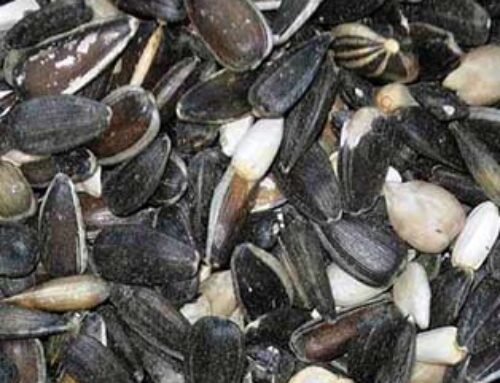If you’re reading this blog, then you are one of millions of people in this country who find pleasure and rewards
watching and feeding birds that come to your yards. Americans do truly love the birds that fill the skies and trees throughout the year. And we should feel good about the help we give them by providing many kinds of bird seed.
At this time of year our feeding stations help more baby birds survive as their parents have more available to feed them. We know that most birds eat insects, even those that we consider seed eaters. Many birds (including Hummingbirds) will provide their young with insects when they’re newly hatched because they are such a good source of protein. With more birds eating more insects we should need fewer chemicals to protect ourselves and our plants from the onslaught of bugs. Reducing chemicals in our environment is Always a good idea. We all have heard about the “canary in the coal mine” – which is another way of saying birds are the signal for us humans when things get messed up with the system. Everything is connected and dependent upon one another. It is truly a web.
So while we comfortably observe and feed the birds around our homes, we have to realize that saving and protecting birds will require more than good intentions. Some of the problems birds face in the world are broad based and very complicated in their scope and solutions. Many require government action and that is where we need to place our attention to really be good stewards of our winged ones.
Loss of habitat, pollution, climate change, overdevelopment of green space, outdoor cats, power lines and skyscrapers are just a few of the threats they face daily. But I’d like to share with you some of the good things that have just happened legislatively that directly or even indirectly influence the health and future of birds. This information comes from the National Audubon Society which is constantly working to educate legislators and other government officials about the status of birds in the U.S.
The bills that have been put together come from the House and so we can’t celebrate yet, since the Senate must put together their own packages and reconcile them with the House bills and then the President has to sign them into law.
The House has proposed an increase in spending levels in the 2020 fiscal year for water conservation and clean
energy programs. This would include restoration projects in the Everglades and in Louisiana, which grow in importance each year. It increases funding for clean energy at the Department of Energy and increased funding for renewable energy. Fossil fuels continue to pollute our air and water, not to mention increase CO2 in the atmosphere with resulting climate problems.
A second House package seeks to increase funding for conservation programs such as the Neotropical Migratory Bird Conservation Act, the North American Wetlands Conservation Act, and Land and Water Conservation Fund. All of these programs have been woefully underfunded for too long, especially when you look at the decline in species each year from so many places on our continent. The bills look at limiting off-shore drilling and old-growth logging activities, which both dramatically impact birds and other wildlife. In December of 2017, the century old Migratory Bird Treaty Act was hit with a legal memorandum by the Interior Department saying that businesses that 
The purpose of all this information is to encourage anyone who spends time and money watching and feeding birds to take the next step and contact your elected officials and let them know that you care for birds in a broad way – for their future and safety. The birds can’t speak for themselves, so we must.
By Kate Crowley



